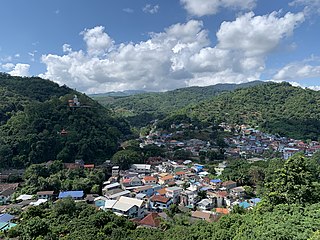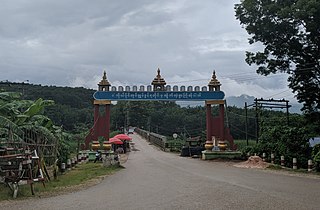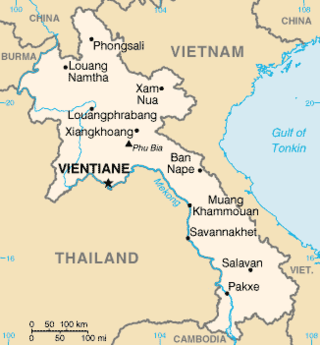
Shan State is a state of Myanmar. Shan State borders China (Yunnan) to the north, Laos to the east, and Thailand to the south, and five administrative divisions of Myanmar in the west. The largest of the 14 administrative divisions by land area, Shan State covers 155,800 km2, almost a quarter of the total area of Myanmar. The state gets its name from the Burmese name for the Tai peoples: "Shan people". The Tai (Shan) constitute the majority among several ethnic groups that inhabit the area. Shanland is largely rural, with only three cities of significant size: Lashio, Kengtung, and the capital, Taunggyi. Taunggyi is 150.7 km northeast of the nation's capital Naypyitaw.

Khun Sa was an ethnic Han drug lord and warlord. He was born in Hpa Hpeung village, in the Loi Maw ward of Mongyai, Northern Shan State, Burma. Before he assumed the Shan name "Khun Sa" in 1976, he was known primarily by his Chinese name, Zhang Qifu.

Wa State is a de facto independent state in Myanmar (Burma) that has its own political system, administrative divisions and army. While the Wa State government recognises Myanmar's sovereignty over all of its territory, this does not include allegiance to any specific government. The 2008 Constitution of Myanmar officially recognises the northern part of Wa State as the Wa Self-Administered Division of Shan State. As a one-party socialist state ruled by the United Wa State Party (UWSP), which split from the Communist Party of Burma (CPB) in 1989, Wa State is divided into three counties, two special districts, and one economic development zone. The administrative capital is Pangkham, formerly known as Pangsang. The name Wa is derived from the Wa ethnic group, who speak an Austroasiatic language.

The United Wa State Army, abbreviated as the UWSA or the UWS Army, is the military wing of the United Wa State Party (UWSP), the de facto ruling party of Wa State in Myanmar. It is a well-equipped ethnic minority army of an estimated 20,000–30,000 Wa soldiers, led by Bao Youxiang. The UWSA was formed after the collapse of the armed wing of the Communist Party of Burma (CPB) in 1989.
Lo Hsing Han or Law Sit Han was a Burmese businessman and drug trafficker. He later became a major business tycoon across Burma, with financial ties to Singapore. He was an ethnic Kokang-Chinese. His spouse, Zhang Xiaowen, is a Chinese citizen and native of Gengma County in Yunnan.

The Shan State Army, also known as the Shan State Army - South (SSA-S), is the armed wing of the Restoration Council of Shan State (RCSS) and one of the largest insurgent groups in Myanmar (Burma). The RCSS/SSA was led by Lieutenant General Yawd Serk until his resignation on 3 February 2014. Yawd Serk was reelected chairman of the RCSS shortly after his resignation and has remained chairman since.

Hpakant is a town in Hpakant Township, Kachin State in the northernmost part of Myanmar (Burma). It is located on the Uyu River 350 km north of Mandalay. It is famous for its jade mines which produce the world's best quality jadeite.

Tachileik is a border town in Shan State of eastern Myanmar. It is the administrative seat of Tachileik Township and Tachileik District and most populated city in eastern Shan State with 51,553 residents per 2014 census count, ahead of Kyaing Tong, but only 4th statewide. It faces Mae Sai in Thailand, and is home to one of Myanmar's seven official border trade posts with Thailand.

Ban Hin Taek or Baan Hin Taek now renamed Ban Therd Thai, is a village found in the Chiang Rai area in the northern part of Thailand. This village, composed mainly of Akha people, has had a very vivid history involving the drug leader known as Khun Sa. Despite being called Ban Therd Thai, the village will be referred to as Ban Hin Taek which is the name the villagers refer to when talking about their village.
Pangkham, known before 1999 as Panghsang, is a border town in Myanmar's far eastern Shan State. It is situated at a bend on the Hka River near the border with Yunnan Province, China, opposite of the town of Menglian. Pangkham is the main town of Pangsang Township of Matman District of Shan State.

The Chin Haw or Chin Ho, also known locally as Yunnanese, are Chinese people who migrated to Thailand via Myanmar or Laos. Most of them were originally from Yunnan, a southern province of China. They speak Southwestern Mandarin.

The Mong Tai Army, was an insurgent group consisting of soldiers from the Shan minority in Myanmar, founded in 1985 by Khun Sa. It had up to 20,000 armed troops at its peak, and was one of the largest forces opposing the government of Myanmar at its time. It was also involved in drug trafficking in Southeast Asia.

The Wa Self-Administered Division is an autonomous, self-administered division of Myanmar (Burma). Its official name was announced by decree on 20 August 2010.

The United Wa State Party is the ruling party of Wa State, an autonomous region in northern Shan State, Myanmar (Burma). It was founded on 3 November 1989 as a merger between the communist Burma National United Party (BNUP) and several smaller, non-communist Wa groups. Its armed wing is the United Wa State Army (UWSA), and its chairman and commander in chief is Bao Youxiang.
Sai Naw Kham was an ethnic Shan associate of the Chinese drug trafficker Khun Sa who operated in the Golden Triangle, a major drugs-smuggling area where the borders of Burma, Laos and Thailand converge. He was executed for alleged involvement in the killing of 13 Chinese sailors.

Kengtung, known as Menggen Prefecture or Möng Khün Chiefdom or Mueng Khuen Fu, classical name Khemarattha, was a Shan state from 1405 to 1895 in what is today Burma. The capital and the residence of the ruler was Kengtung in the centre of the state. It was the only urban area in this mountainous state whose landscape is dominated by the Daen Lao Range.

The Shan State National Army was a Shan nationalist insurgent group that fought against the then ruling State Peace and Development Council military regime of Myanmar (Burma). The commander of the SSNA was Colonel Kan Yod.

The 1967 Opium War took place in northwestern Laos between February and August 1967; actual fighting took place from 29 July to 1 August 1967. A mule train, led by Burmese militia, carrying 16 tons of opium crossed into Laos to Ban Khwan, where they were attacked by rival drug smugglers from the Chinese Nationalists' Third and Fifth Armies. The intended recipient of the shipment, Royal Lao Army General Ouane Rattikone, bombed both sides while moving in troops to sweep the battlefield. With both Burmese militia and Nationalist Chinese defeated and expelled from Laos, the Lao general confiscated the opium for himself.

The Wa National Organisation is a political organisation in Shan State, Myanmar. It has an armed wing, the Wa National Army (WNA), that operates near Myanmar's border with Thailand.
Homein also known as Homong, Homöng, Ho Mong and Wān Ho-möng, is a village in Langkho Township, Langkho District, southern Shan State, Myanmar (Burma).
















